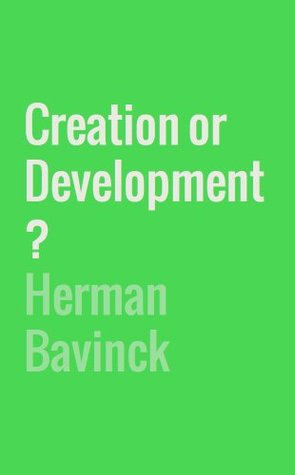- Bíblia
- Leia a Bíblia
- Versões da Bíblia
- Verso do dia
- Planos de Leitura
- Versos por Tópico
- Books of the Bible
- Imagens bíblicas
- Estude
- Comentários
- Concordâncias
- Dicionários
- Enciclopédias
- Sermões
- Bible Atlas & Maps
- BP Wiki
- Devocionais
- Devocionais de hoje
- Light of the World
- Todos os devocionais
- Inspirational Quotes
- Mais
- Picture Quotes
- Videos
- Inspirador
- Estudo da Bíblia
- O que a Bíblia diz
- Bible Q&As
- Daily Bread
- Bible by Genre
- Bible Stories
- Random Bible Verse
- Comunidade
- Store
Creation or Development?
by Herman Bavinck
"Unless we are mistaken in our interpretation of the signs of the times, the twentieth century, upon which we have just entered, is to witness a gigantic conflict of spirits. Faith and unbelief, says Göethe, is the deepest theme of the history of the world. This it has been in the centuries that lie behind us. This it was in that one which we have just closed and abandoned to the past. And this it will be above all things else and in an entirely special sense in the twentieth century, which has just disclosed itself to us. For the conflict of convictions and intentions has spread itself across an ever-widening domain, and has assumed an even more radical character. It is well known that at present this conflict is no longer confined to one or another article of our Christian confession, to the authority of Scripture or tradition, to justification or election; and not even any longer to the Deity of Christ or the personality of the Holy Spirit. But in the spiritual conflict which is now waging in every part of the civilized world, the points at issue more and more are the principles of Christianity itself, and the very fundamentals of all religion and of all morality. This conflict extends the whole length of the line. More serious and fiercer than ever before the conflict is between the old and the new world-view. For man has undertaken the gigantic effort of interpreting the whole world, and all things that are therein, in their origin, essence, and end, what is called purely and strictly scientifically, that is, without God, without any visible, supernatural, spiritual element, and simply and alone from the pure data of matter and force."
BUY NOW
Kindle Edition, 24 pages
Published July 2nd 2013
Se inscrever
© 2026 Bibleportal.com Todos os direitos reservados.

Born on December 13, 1854, in Hoogeveen, Drenthe, Holland, Herman Bavinck was the son of the Reverend Jan Bavinck, a leading figure in the secession from the State Church of the Netherlands in 1834. After theological study in Kampen, and at the University of Leiden, he graduated in 1880, and served as the minister of the congregation at Franeker, Friesland, for a year. According to his biographers, large crowds gathered to hear his outstanding exposition of the Scriptures.
In 1882, he was appointed a Professor of theology at Kampen, and taught there from 1883 until his appointment, in 1902, to the chair of systematic Theology in the Free University of Amsterdam, where he succeeded the great Abraham Kuyper, then recently appointed Prime Minister of the Netherlands. In this capacity -- an appointment he had twice before declined -- Bavinck served until his death in 1921.
... Show more